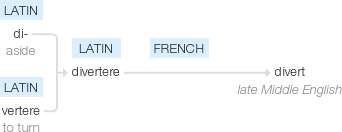Divert
late Middle English: via French from Latin divertere, from di- ‘aside’ + vertere ‘to turn’.
wiktionary
From Middle English diverten, Old French divertir(“to turn or go different ways, part, separate, divert”), from Latin di-(“apart”) + vertere(“to turn”); see verse.
etymonline
divert (v.)
early 15c., diverten, "change the direction or course of; change the aim or destination of, turn aside or away" (transitive), from Old French divertir (14c.) and directly from Latin divertere "to turn in different directions," blended with devertere "turn aside," from vertere "to turn" (from PIE root *wer- (2) "to turn, bend") with, in the first word, an assimilated form of dis- "aside," and in the second with de- "from."
Sense of "draw off (someone) from a particular intention or state of mind" is from c. 1600, hence the meaning "amuse, entertain" (1660s). Related: Diverted; diverting.
